Jonathan Heaf: Let’s begin with The Dark Knight – the second instalment of the reinvigorated Batman franchise. What can you tell me about it?
Christian Bale: This time around, Chris [Nolan, the film’s director] and I were allowed to spread our creative wings a little more. Before we were involved, the Batman franchise had gone to pot – everyone knows that. And to be honest, when we took it on, it was a big gamble; an awful lot of people thought we were destined for failure. This time around, as Batman Begins was such a success, the studio wasn’t so cautious about what we were doing with its money. There was much more faith in me, in Chris and in the direction he was taking the film.
A marked contrast between Batman Begins and the previous Batman films was your focus on Bruce Wayne’s past and on humanising the man behind the mask. As the story of Wayne’s evolution – from frightened boy into fearless crime fighter – has already been told, did you find it hard to bring a similar depth to the role this time around?
In the early Batman films, even the Tim Burton movies, there was always that moment when, as Bruce Wayne came into shot, the audience would groan. The perception was that without his mask Batman was bloody boring, so we had to develop him into something more engaging. With Batman Begins that’s just what we did and, at the end of the movie, we see someone who has achieved what he set out to achieve. In The Dark Knight, Bruce Wayne’s naivety comes to the fore. For some reason, he thought all this crime-fighting would be a finite endeavour; he thought once he had cleaned up the city of criminals he would be able to hang up his suit and go back to a relatively normal life. In this film he realises there are consequences to his actions, things have changed because of him and he has more responsibility than he presumed. He can’t hang up his cape and walk away. Everything evolves – even crime.
Heath Ledger stars as Batman’s nemesis, the Joker. In January this year the 28-year-old actor tragically overdosed on a cocktail of prescription pills. What was he like to work with on this film?
Wonderful. He was a fantastic guy, we had a lot of fun on set. Yes, he immersed himself into the film completely, but, at the same time, he was so easy-going. Heath was infectious; his death makes me angry because I know our friendship would have blossomed had he not died. He’s done a real defining characterisation of the Joker that both audiences and the industry will no doubt praise and then acknowledge in time.
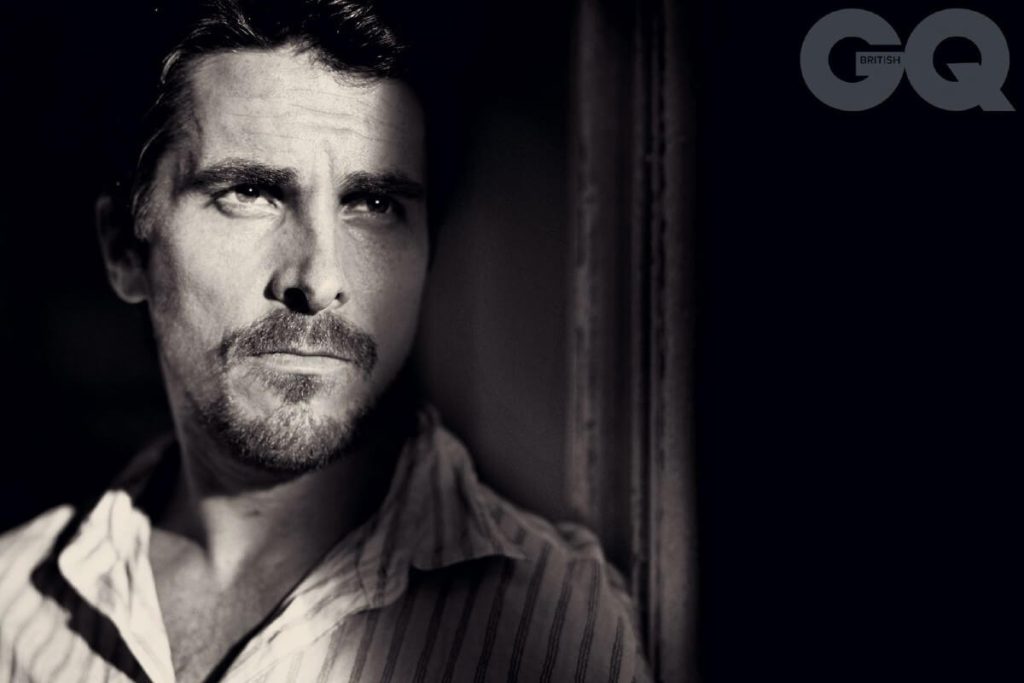
Were you ever worried about Ledger’s state of mind, or the effect playing such a psychotic character might have on an actor so committed to his craft?
Heath would have done whatever he felt was necessary for the role. He was someone who took his work incredibly seriously. And that’s what Chris and I were aiming for with these movies: to see through the comic books and cartoons and make the characters real and terrifying and twisted and human. With the first film critics were like, “What? Take Batman seriously? Are you kidding?” – it was laughable to many, but that’s precisely the road that we wanted to take. Heath is on board with that philosophy completely… I keep catching myself talking about him in the present tense, which is very upsetting. I was obviously with him at that time, but I can only speak for myself. Yes, sometimes I look back and think, “OK, maybe I went a little bit too far, committed a little bit too much of myself.” But I don’t regret doing it. But I don’t want to talk for Heath; this is a conversation I’d be having with friends and family, and is far too personal to be talking about in relation to the release of a movie. It’s just not my place.
Was there any worry that, after Ledger’s death, the movie would have to be altered or changed?
Not as far as I know. Listen, it’s not up to me – that’s Chris’ job – but I personally don’t believe in that anyway. I believe you should respect somebody’s work – don’t change it. That is his art – if you want to call it that. And it would be disrespectful to go and deal with what was captured on film in a different way than had Heath been alive. But, as I say, that is out of my hands. Chris is a very private director and there’s certainly no way he’d be letting me into the editing suite. I tried once, I got a very polite, “F** off.”
Obviously the Bat gadgets and firepower are vital components to any Batman blockbuster. Did you get to lark about on anything spectacularly dangerous?
Well, there’s the Bat Pod – essentially a steamroller combined with a superbike combined with an atomic missile. Embarrassingly, I didn’t get to ride it. There are other motorbikes in the film that I got to burn about on, but not the Bat Pod – it was deemed too dangerous. Well, that’s my excuse. In fact, the guy who did ride it in the film, Jean-Pierre Goy, was the only guy, out of dozens of bike champs and stunt men on set, who could actually stay on the damn thing for any length of time. Everything he learnt about riding a motorbike he said he had to unlearn to ride the Bat Pod. I’ve asked the producers if I can have a go on it before the premiere, so that I really can ride it before I get asked any more of these questions – you can’t be Batman and not have been on the bloody Bat bike!
Did you get to risk your neck in other ways?
Thankfully, yes. We were shooting in Chicago one day and I overheard a couple of the stunt guys talking about a shot that needed to be set up, with Batman hanging off the edge of the Sears Tower. They wanted a stunt guy to do it but I was like, “What? No, no, no. I am doing that.” I had to wrestle a bit with the producers but eventually I twisted their arms. A few days later I was standing 110 storeys up, looking out over Chicago, on the edge of one of the tallest towers in the world, with a helicopter about two inches from my bloody face. Did I have a safety rope? Yeah, just don’t tell anyone. But it was a thrill; it got the heart going – especially when the wind picked up and I was leaning all the way out over the edge. I mean, you can’t play a superhero and not enjoy it, right?
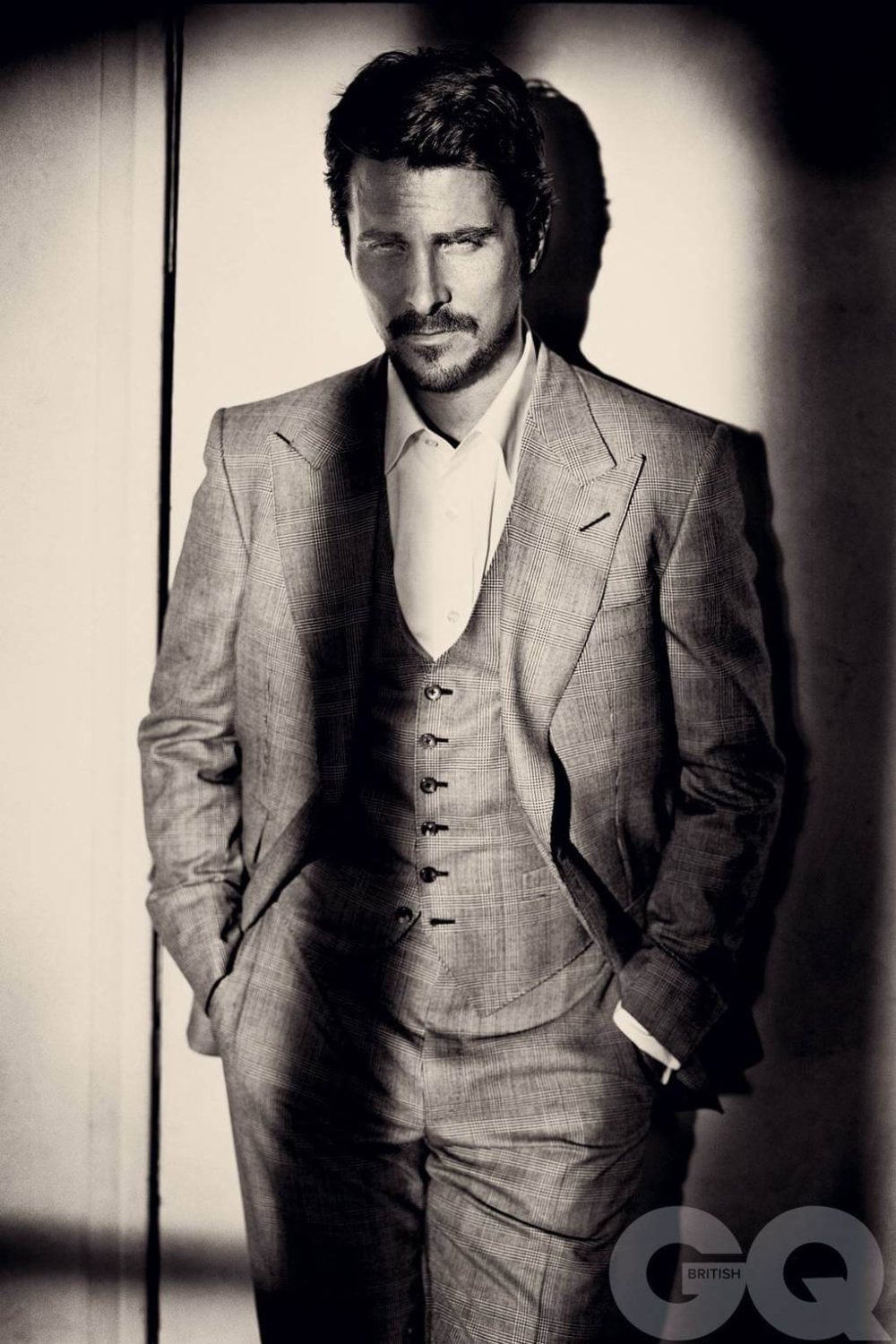
This is the third feature film you’ve worked on with Chris Nolan in three years – Batman Begins, The Prestige and now The Dark Knight.
I completely understand if he’s a little bit sick of the sight of me and if he wants to go and bounce off someone else for a movie or two. I mean, I would never presume or take our working relationship for granted. But I have to say, once you’ve been doing this sort of thing for a while, it’s nice to finally be able to establish professional friendships where you can return, again and again. Basically, you just cut out all the polite bulls* and you don’t have to bother walking around each other on eggshells for the first two weeks of shooting. I would certainly hope he would be on board for a third instalment of Batman. If he wasn’t, I’d have to think long and hard about whether I would want to continue myself.
How do you prepare for a role? Do you have particular rituals?
I never enjoy breaking down my methodology. Sometimes it starts with a voice or an accent, but not always. The differences between a Werner Herzog shoot, a Terrence Malick shoot and a Chris Nolan shoot are vast, and so I’ve never had just one method that has worked for me consistently. I start from scratch with each movie; I certainly don’t rely on some bag of acting tricks I’ve amassed over the years. Sometimes you get directors who love the rigorous research, while others simply say to you, “Hey, you’ll be fine, just turn up on set and wing it.” Sometimes you don’t need to toil over the minutiae.
On preparing for his role as the Joker, Heath Ledger kept scrapbooks, notebooks, drawings and artwork. Is this a technique you’ve employed in the past?
It differs from role to role. I’m currently working with Michael Mann on a film called Public Enemies. Johnny Depp plays [the notorious Thirties American gangster] John Dillinger, I play [top FBI agent] Melvin Purvis – the original G-man. I have huge files on the subject, transcripts of interviews, books and biographies. What’s important is to know how to digest and condense all this information – that’s the key. It’s all very well doing the research but if you can’t react to it instructively, your performance will suffer. But you do whatever is necessary. Heath played Bob Dylan, as I did, in I’m Not There, and we all kept scrapbooks; Todd Haynes [the film’s director] encouraged this. Of course, everyone has a life outside of work. Sometimes all these aids do is help you click back into character more quickly.
You mentioned that in the past you’ve thought you’ve gone too far in preparing for a role. Which role exactly?
The weight loss in The Machinist is a clear example. I would say in hindsight that perhaps I went a little too far [Bale lost four and a half stone for the part]. Not in a way that was particularly dangerous but it certainly got, shall we say, interesting, in ways that friends and family noticed – and didn’t particularly enjoy. And for me, just because you finish filming and the sets are dismantled and you go home, it can be a difficult, long process to find your normal self again. Will some deep part of you be altered indefinitely? Sure. And that just comes down to a way of working. Not all actors have this problem. Look, if I could switch it on and off like a lamp, that would be phenomenal. But I can’t, I have to dig my way out of it.
How does your wife feel about such a departure from the person she loves?
Well, she gets to sleep with a whole bunch of different men, so maybe it’s not so bad for my wife. And she does it without having to feel guilty!
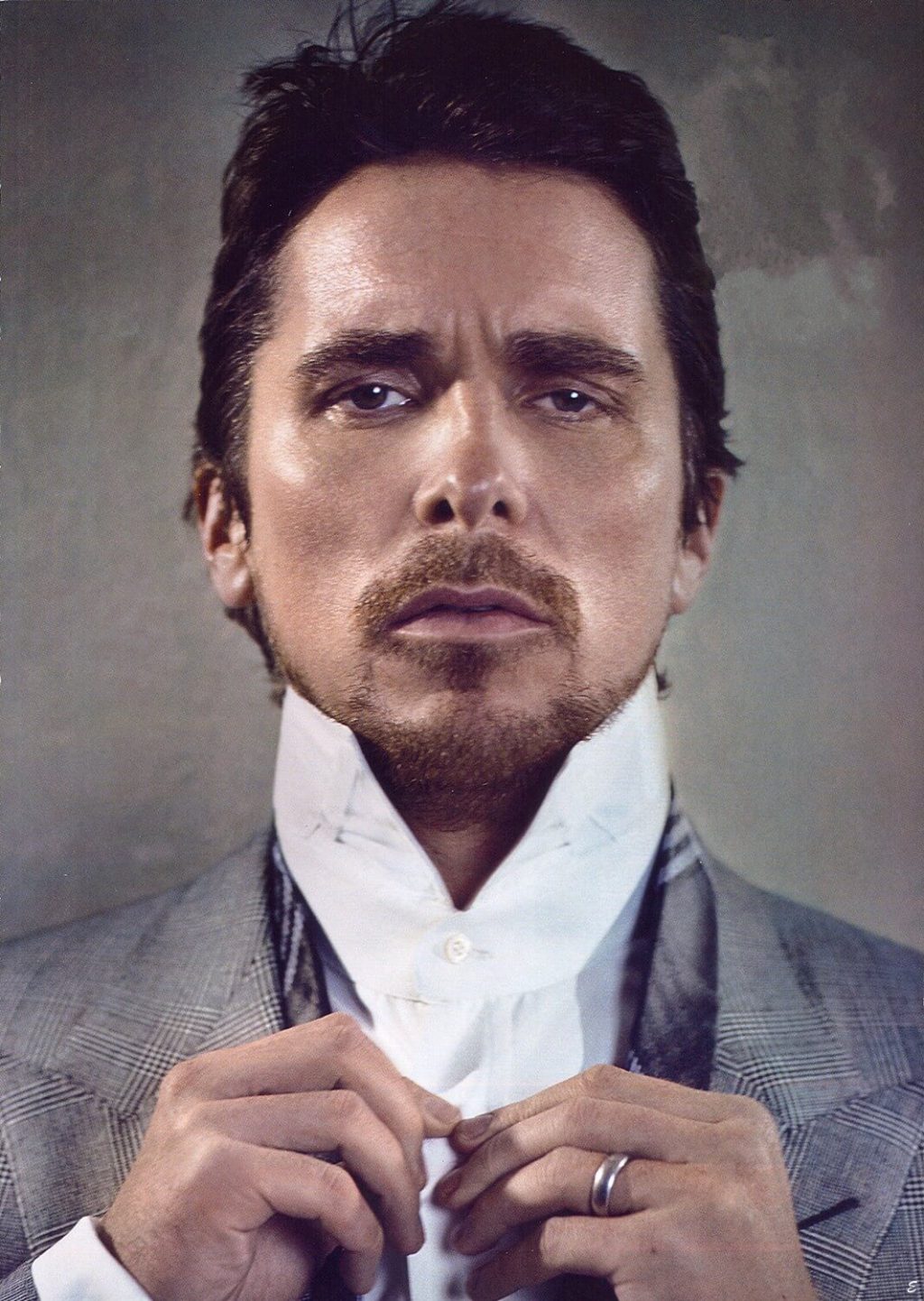
Your crash diet for The Machinist has been well-documented – a can of tuna and an apple a day, plus plenty of whisky and cigarettes. But you lost a fair bit of weight for 1998’s Velvet Goldmine, too…
Yes, although I didn’t do the rakish rock-star thing all that successfully, I have to admit. For Velvet Goldmine I started running very early in the morning before any breakfast, but it didn’t seem to be having much impact on my waistline. My mum came down to stay with me in London during filming and said, “Listen, why don’t you just try to do what rock stars did back then. They weren’t up running on an orange at 6am! Their diet was sex, drugs and rock’n’roll!” What a diet for a mother to prescribe, right?
You were shooting The Dark Knight for seven months; how do you keep the motivation up on those epic blockbusters, when the pyrotechnics and the lights take so long to set up?
Well, it can drag but, hey, you want to work, right? It’s a matter of pacing yourself. On those long, intricate shoots you do really have to find other things to distract you while on set.
I’ve had a lot of time on set or on location basically doing jack. During the Batman films, I started thinking that I should perhaps be doing things in the interim, so at the end of a shoot not only can I say, “Well, I made this great movie,” but also I achieved – “this”. Whether it’s writing a book or painting or whatever.
Ever happen?
Not once! All I’ve ever ended up with in terms of achievements is the movie, some really stupid anecdotes, a bunch of crosswords that I didn’t finish and maybe some old bicycle that I found lying around on set.
Your on-set experiences haven’t always been quite so tepid. Crossword-solving sessions can’t have featured so heavily while you were working on Werner Herzog’s Rescue Dawn. Herzog has a fierce reputation – legend has it he once pulled a gun on maverick actor Klaus Kinski. Ever worry about rubbing the director up the wrong way?
Not at all. In fact, I relished the opportunity. I do think of Werner as a kindred spirit. He can be the kindest of souls and then the most cantankerous man you’ve ever come across.
The atmosphere on the set of Rescue Dawn was described by some crew members as “toxic.”
It depends who you talk to. Some people might have thought of it that way, but personally I loved it. I was laughing my ass off most of the time. We had half the crew quit at one point. In the middle of all this chaos we were trying to make this wonderful movie. Walking barefoot through the jungle for hours on end, people cutting themselves, covered in band aids or cuts held together with Sellotape – I had a terrific time.
Your childhood was fairly adventurous – nomadic even…
My family moved about a lot, yes, through necessity rather than choice, perhaps, but I loved it. That life is not for everybody, granted, but having that as a child certainly set me up for the sort of life I lead now. You could say I’m indebted to my father’s rogueish behaviour. We jumped about all over England, we had a brief stint in Portugal, but it wasn’t like being on holiday. It was my father’s doing really, he steered the family through some tough times.
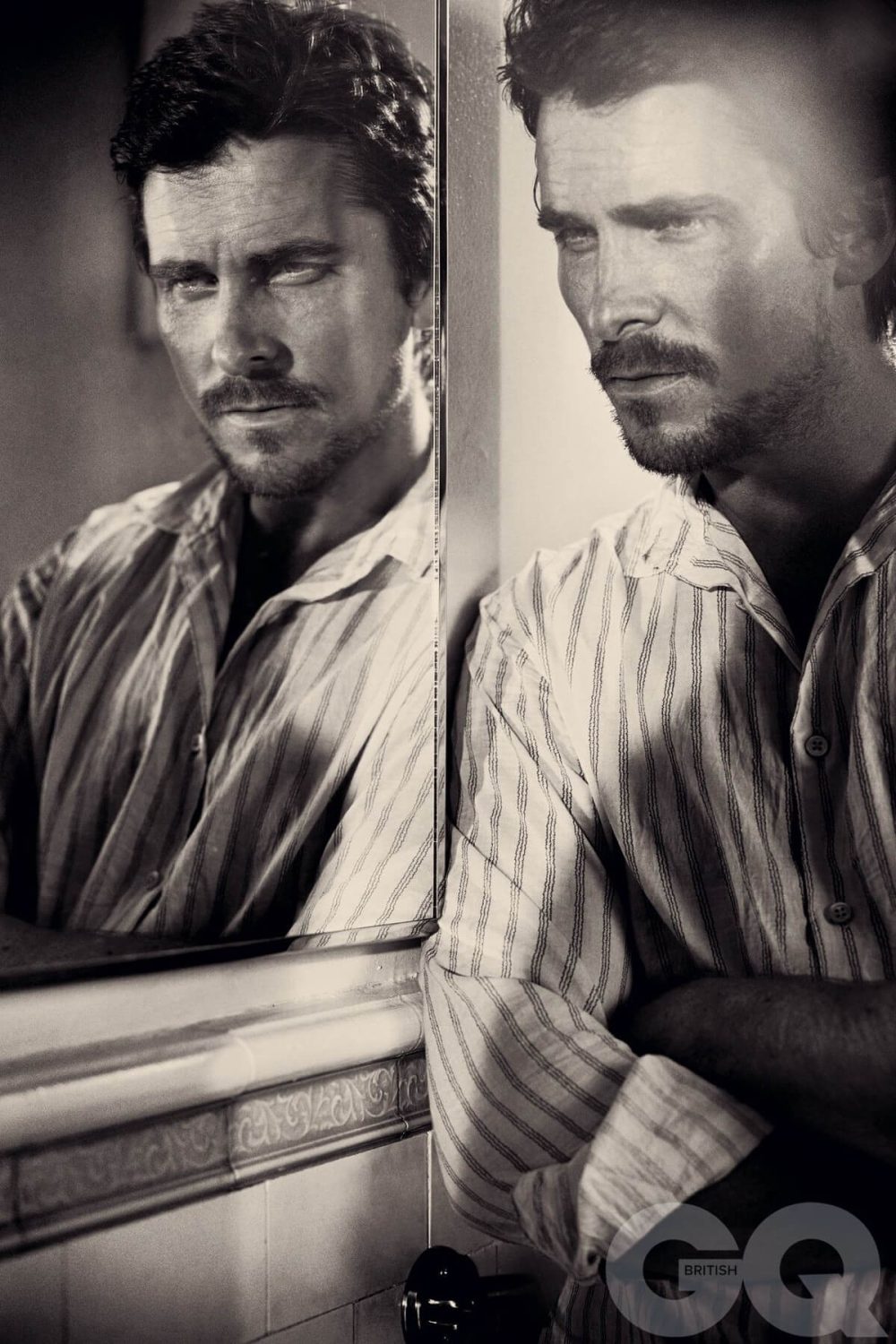
What sort of a man was your father?
He was a man who was wonderful in a crisis; just the best kind of person you need when the chips are down. As a family, there were times when we found ourselves having to move out of our house – and quickly. Within the space of two hours my father had found us a safe, warm, dry place to stay. I never really asked any questions.
What was your father running away from?
There were various reasons. He was restless. Like every great character you play, like every interesting person I guess, they’re complex. There was a great complexity to my father. He was a devoted family man. But, in the same breath, he simply was not suited to an anchored life. He should have been somebody who had a backpack, an old map, a bit of change in his pocket and that was it – roaming the world. But through consequence he found himself a family and he was honourable with that, despite perhaps it going against his wilder instincts.
Was all this apparent to you while growing up?
It was certainly apparent that he was battling on two fronts – his instincts and his responsibility. He was trying to do the stable, family-guy thing, but you could tell something was dying within. There was definitely a restlessness to him, which I share. Not that it’s anything I see as a negative, just a desire to search himself and the earth for something else.
How has having a family affected you and your attitude to work? Now you’re not only responsible for yourself but your wife, Sibi, and your three-year-old daughter.
Well, what I’ve started to realise – and this is perhaps the first time in my life when I’ve ever been able to do this – is that, well, I’m not doing too badly, really. I wince a little when I say that, not because I’m not grateful for what I’ve achieved but because I’ve been working non-stop, striving at each and every audition to get those great jobs and to put food on the table.
And the time I spend with my daughter is just incredible. She’s a little rascal. I’m not going to miss her growing up for anything, not even for Batman. I’m certainly not going to be one of those fathers who picks up a photo of his daughter and has regrets about not being around.
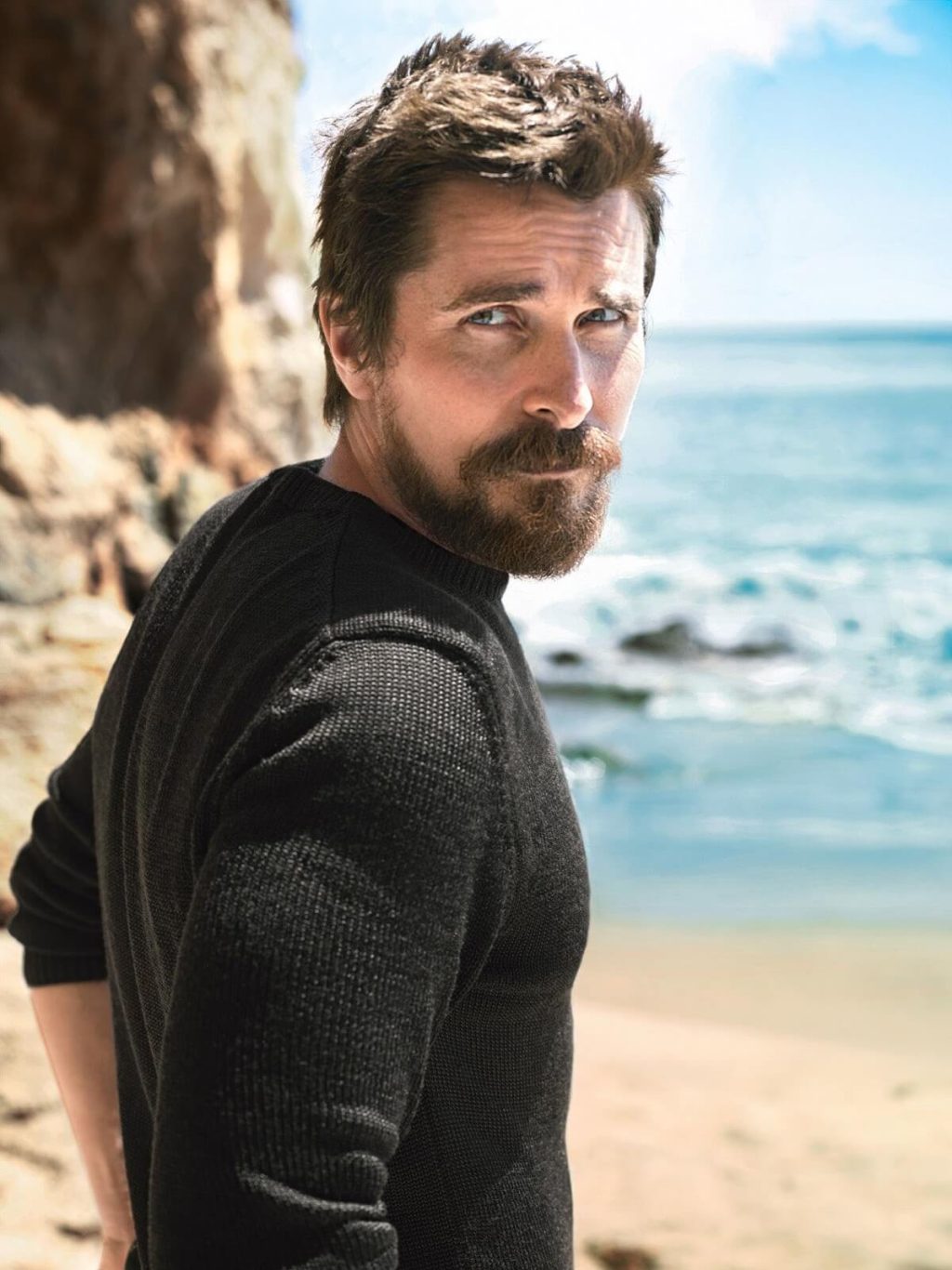
And the weight loss, the superbikes, the standing on skyscrapers?
People will say, “Why is he still doing this crazy s***?” But I’m OK with that. I’d like my daughter to see me do these things, as I saw my father do some crazy things and learnt to appreciate it. My philosophy isn’t so much, “Do what I do.” It’s more, “Whatever you do, do it completely. Don’t do it half-arsed. Do it more than anybody else would.”
Do you think that starting so young in Hollywood affected you in a negative way?
I did enjoy doing those early films, but would I ever let a child of mine do the same? No, absolutely not. My family at the time were in a very different set of circumstances and, when I look back, it’s bittersweet. Of course, I wouldn’t be doing what I am now if it weren’t for films such as Empire Of The Sun – I do appreciate that, and the money was certainly something that helped my family at the time. But as I said, no child of mine would be put in that position. This isn’t meant as a critique of my own parents – they were very different times. But there are and were consequences of me doing that as a child – psychological things. I mean, I didn’t know it was happening to me at the time; I didn’t know that damage was being done. It seems bloody obvious in hindsight but, at the time, it was impossible to see that it could be a bloody nightmare for a kid, in almost undetectable, subtle ways. There are real dangers.
Listen, I am a lucky git. To sit here and say, “You know what, I don’t want to work for the next six months,” and then actually be able to do that? I never imagined I would be in that position. It’s luck that I am male; luck that I speak English, and luck that I am white. Unfortunately, that’s the stereotype in the movie business; anyone who isn’t any of these things would have had a tougher time than I did.
And your talent? Does that count for anything?
I bust my ass at work, but there are endless people who [work hard] and don’t get the breaks that I did. I would love to sit here and say, “You know what? It was all me, thanks very much. It was all down to hard work and a supreme talent.” But no. To a certain extent, I got lucky.
The Machinist was a real turning point in your career. A few years before that you’d been involved in a handful of big-budget flops: Reign Of Fire; Captain Corelli’s Mandolin; Shaft. Did you ever get despondent?
Yes, although it’s not that I didn’t think I would ever get another good job. It wasn’t a fear of failure or losing money or my house or anything like that. I have made some mistakes with my film choices; I didn’t want to admit it to myself but I knew deep down. There are a couple of movies I did that today I wouldn’t touch with a bargepole. It’s always good and humbling to be able to hold up a particular project and go, “S*, I was bloody awful in that film. That. Is. A. Truly. Terrible. Movie!” It’s good to know I can always do “awful”, you know? So each time I nail it, I always remember that I can f*** it up quite beautifully, too.
How depressed were you before you landed the part in The Machinist?
I don’t know about clinically depressed or whatever you want to call it, but those around me – my friends and family – were very aware something was wrong. I was staring at the walls for hours on end and I was considering other professions. That’s perhaps why I threw myself into The Machinist so obsessively. The movie itself didn’t do particularly well, and it certainly wasn’t everybody’s cup of tea, but it was the project that gave me the kick in the arse I needed. It straightened my head out.
You’d had this flux in your career previously – a lull in work and then a period of intensive preparation – for American Psycho, in fact.
You’re right, I did find myself in a similar situation for American Psycho. I hadn’t worked for about a year and a half before making The Machinist, and before American Psycho I had a period of preparation for about a year and a half. We made it at the end of 1999 and I hadn’t worked since very early 1998. This also has something to do with the nature of independent movies, how they are funded and how they are filmed. They say they’re going to be ready to shoot in April, then they’re like, “Ah, no, we’re filming in June, sorry.” So you train and work for June, then it’s August, then November, then January…
Wasn’t it Viggo Mortensen who worked for a year preparing for the part of Sgt Elias Grodin in Platoon, only for Oliver Stone to then hand it to Willem Dafoe?
It’s a blow when that happens. So much in life, for me, is about having a sense of purpose and, when someone pulls that belief from under you, it can be just horrible. The problem comes when the mental rot sets in and you start thinking, “Well, maybe I shouldn’t give that sort of commitment to a part again.” Then you end up unhappy and mediocre. Although you don’t get into acting if you can’t deal with rejection, right?
It’s been a close call sometimes. I mean, take American Psycho. I was told they perhaps had someone else in mind but I kept on at it like a crazy bastard. I mean, they had Leonardo DiCaprio all primed for it, but I just kept rehearsing, training and preparing. People would look at me sort of worryingly, and I’d stare them in the face and say, “Listen, I am definitely making this movie!” A look of pity would fall across their faces – “Christian, I’m sorry but you’re not. What the hell are you doing?” When Leo dropped out the casting guys were like, “What happened to that crazy, obsessed guy we saw months ago?” And people said, “That crazy f**er is still preparing. He hasn’t taken any other jobs.” Eventually they came back to me.
Is it true that after DiCaprio, Ewan McGregor was offered the part and you phoned him up and told him in no uncertain terms not to take the part?
Absolutely. I phoned a few people and let them know my commitment! I called them all and told them it was my role. Don’t touch. Step away. Or if you’re not going to step away, understand what you’re up against.
Is it true you auditioned for the role of Robin in Batman & Robin?
No, that one isn’t true. And I never would have. Let me tell you, if Robin somehow crops up in one of the new Batman films along the line, I’ll be chaining myself up somewhere and refusing to go to work.
Another character somewhat unbalanced psychologically was the cop you played in Harsh Times. You were named as executive producer in the credits – what does that mean exactly?
It doesn’t mean s*. I’m still waiting for someone to tell me what a producer actually does. What is the difference between a great producer and an awful one? Essentially, it was a phone call I made to David Ayer [director of Harsh Times] to say, “Let’s just get it done, let’s make it happen.” He was then able to go to the financiers and say, “Look, Christian is on board.” It was something David and I had been talking about doing for years. I actually called him up when we were making the first Batman film and begged him to get it together. I needed it – 20 days of running around and shooting every day was a godsend after that long Batman shoot. Dave, being the generous character that he is, and in lieu of payment, gave me a nod on the crew credits. No idea what it means. I just thought it sounded good.
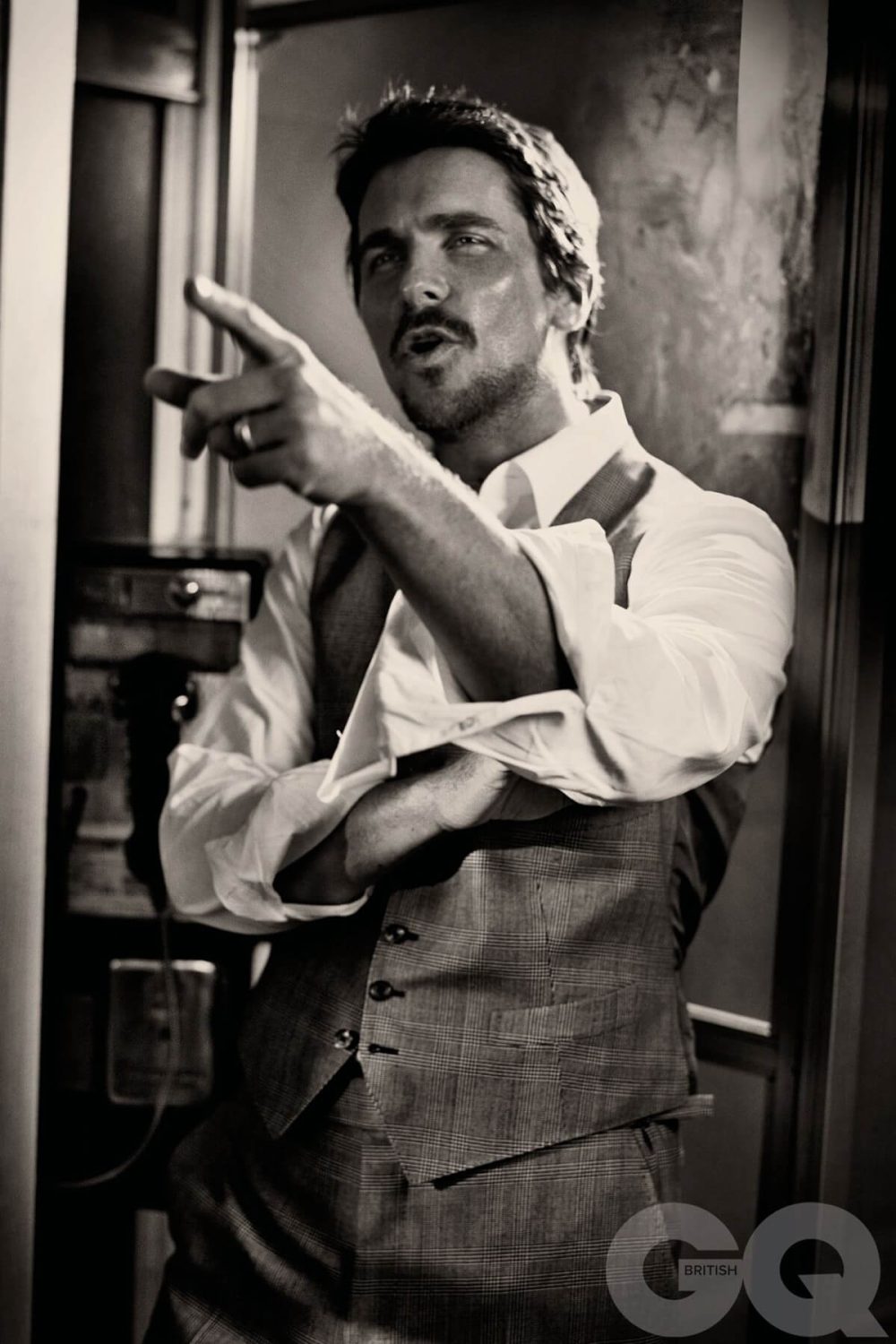
And perhaps “Christian Bale, director” would sound even better one day?
I’m not sure about my ability to converse, be patient, be interested in a lot of people at the same time – to handle a team, if you like. What I love about my job is being able to focus on one thing very intensely. I do love having conversations with directors, but you can come up with the most wonderful ideas when it’s not your responsibility. No, no plans whatsoever to direct.
You’re known for being a very private star. But Batman was always going to make you more recognisable. Was that something you considered at all on taking the job?
I used to think about it way more when I wasn’t being recognised. For ages I used to think people were staring at me and I’d think, “Oh no. I’ve been spotted by some deranged fan.” But of course they hadn’t really recognised me at all, I just had something unsightly coming out of my nose. But anonymity back then was a lovely thing. Strangely enough, I was wandering around Rome recently, I think I was having insomnia issues or jet lag while filming, so I kept going for these late-night walks. I kept seeing this same guy wandering around some evenings, looking a little lost like me. I waved and said hello to him one night – it was f**ing Viggo Mortensen. So it seems the only people who spot me are fellow sleepless actors in Europe!
[credit date=”Aug.2008″